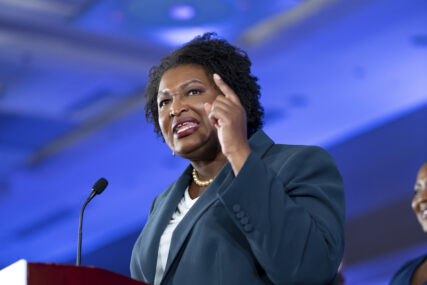Bowing to voters, candidates concede with help from a higher power
(RNS) — The concession speech is unlike any other campaign address. A long-standing political ritual that’s equal parts agony and gratitude, it’s often mixed with palpable relief and unaccustomed honesty as the candidate veers into unscripted territory. And if election night on Tuesday (Nov. 8) is any indication, it’s a uniquely vulnerable instance: a fleeting moment when a candidate can appeal to their loved ones, higher ideals and, often, a higher power.
“You deserve nothing less than the best God has to offer,” Democrat Charlie Crist told the crowd of campaigners after losing to Florida Gov. Ron DeSantis. “And I want to thank God. God is real, and God exists, and all glory to God, because we have so much to be thankful for.”
Crist’s seemingly impromptu confession of faith was striking in a time when many Democrats, while more comfortable with religion in the public square than in campaigns past, still talk in terms of “faith outreach” more than in terms of personal belief in God.
Another Democrat, Stacey Abrams, conceded her bid for Georgia’s governorship by recalling her Methodist faith, which she inherited from her pastor parents. “Because I come by it honestly, because my parents are Reverend and Reverend Abrams, I am too reminded of what Scripture tells us,” she said, promising to carry on her fight for voting rights for all. “Second Corinthians 4:8 says this: We are troubled on every side. Yet not distressed. We are perplexed, but not in despair. Persecuted, but not forsaken. Cast dead on, but not destroyed.”

Stacey Abrams, Democratic candidate for Georgia governor, gives a concession speech in Atlanta, Nov. 8, 2022. (AP Photo/Ben Gray)
Tim Ryan, the defeated Democratic U.S. Senate candidate in Ohio, who has talked about his Catholic upbringing on the trail, ended his campaign by making an appeal for an end to partisan polarization that, while not overtly religious, focused on the concept of grace.
“There’s way too much fear, there’s way too much division,” Ryan began. “We need more love, we need more compassion. Those are important things. We need forgiveness, we need grace, we need reconciliation, we need to leave the age of stupidity behind us.”
In a few races where votes are still being counted, religious language was heard too, though more in the vein of intercessory prayer. In Colorado’s 3rd Congressional District, where Republican Rep. Lauren Boebert, an outspoken Christian nationalist, unexpectedly found herself in a back-and-forth with Democrat Adam Frisch in the vote count, Boebert prayed, “In the name of Jesus, I just thank you for these people — they are so precious, God,” she said. “We plead the blood (of Jesus) over our elections, Father God. There is a hedge of protection.”
Boebert then appeared to at least acknowledge the possibility of a defeat: “I thank you God for everything you are doing. Jesus, it doesn’t matter who is in office because you are king.”
As results trickled in in Arizona, Republican gubernatorial candidate Kari Lake also turned her fate over to God — albeit only insofar as it guaranteed divinely inspired victory.
“I did a lot of praying to God. I’ve been praying to God every day all day,” said Lake, who later cast aspersions on Arizona’s vote-counting process. “And I said to him: You make this victory come whatever way you want. If it comes decisive to us on Election Day, then bring it to us that way.”

Kari Lake, Arizona Republican candidate for governor, cheers with her supporters at the Republican watch party in Scottsdale, Arizona, Nov. 8, 2022. (AP Photo/Ross D. Franklin)
Some who had already lost also appealed to heaven as a last hope: Darren Bailey, who lost his race against returning Illinois Gov. J.B. Pritzker, began his concession speech with the caveat that “there still room for a miracle, friends.” In Pennsylvania, Doug Mastriano’s wife, Rebbie, called on “intercessors” and supporters to pray with her, despite her husband’s 14 percentage point loss. (Mastriano, for his part, followed by insisting supporters wait until every vote is counted.)
Winners, of course, invoked God as well. Mastriano’s opponent, state Attorney General Josh Shapiro, campaigned by leaning into outreach to religious voters and his own Jewish upbringing. He often contrasted his views with those of Mastriano, who became a figurehead for Christian nationalism and sparked outcry over his ties with antisemitic voices.
“I’ll tell you what else won tonight: Real freedom won today,” Shapiro said. “The kind of real freedom that sees possibility in all God’s children, which forces us, then, to step up for those kids and invest in their public school to give them a shot. The kind of real freedom that allows us to invest in a safer community so that all God’s children make it till their 18th birthday.”
Florida Gov. Ron DeSantis, after dispatching Crist, not only talked in biblical terms, but seemed to cast Florida as ancient Israel, and himself as Moses.
“The woke agenda has caused millions of Americans to leave these jurisdictions for greater pastures — greener pastures,” DeSantis said. “This great Exodus of Americans, for these folks, Florida has served as the Promised Land.”


